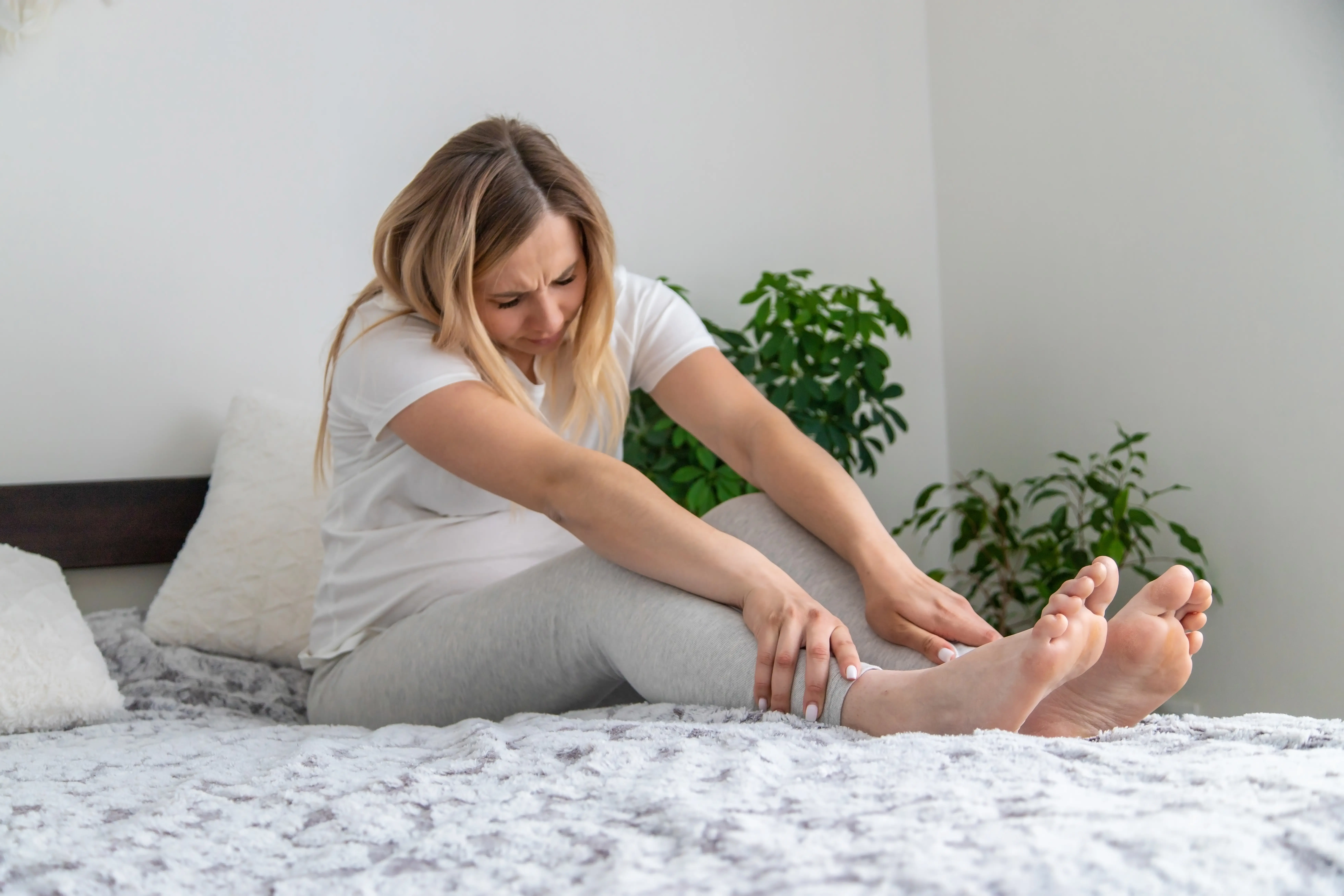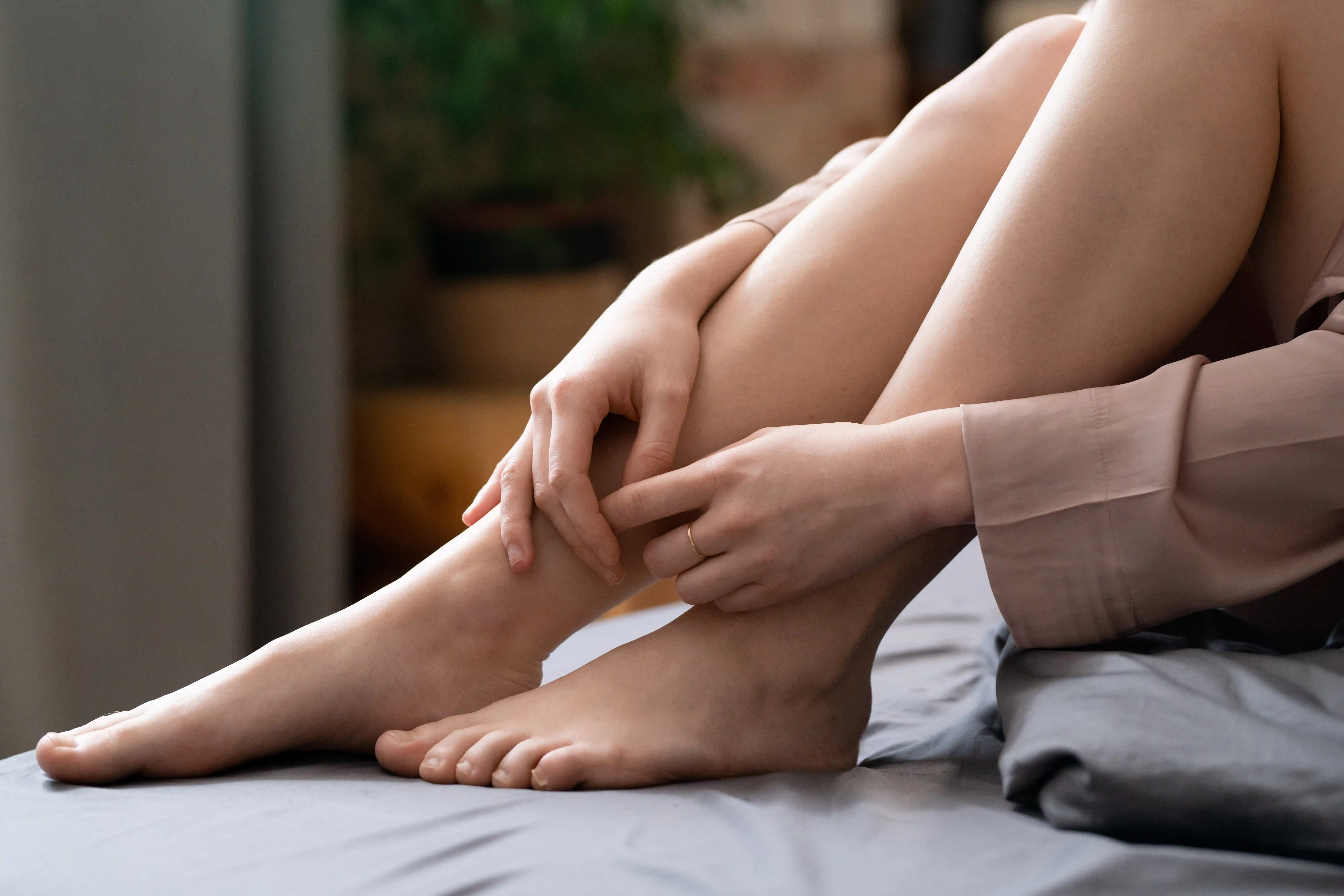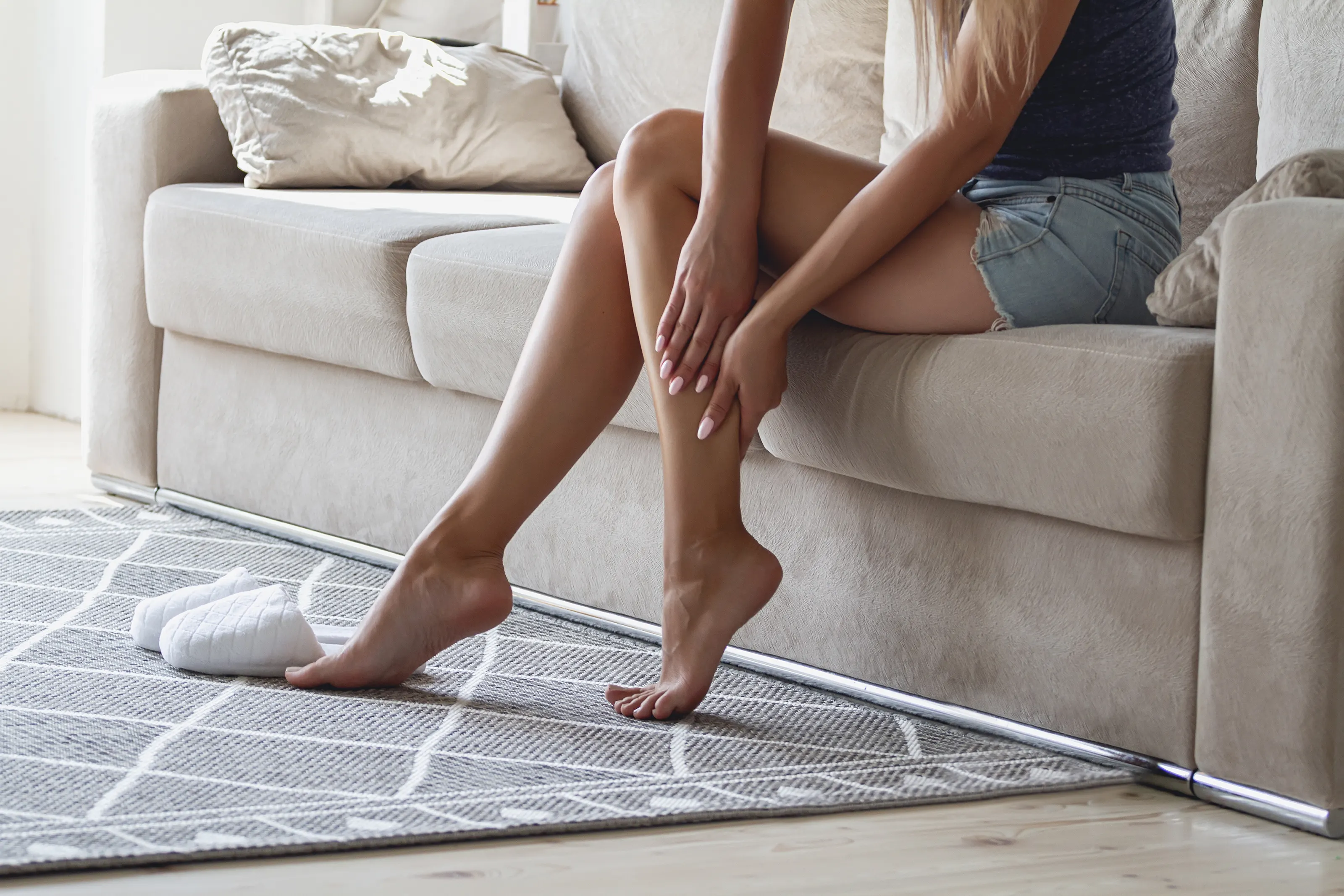Sleep plays a crucial role in maintaining overall health and well-being, often overlooked in today’s fast-paced society. The importance of sleep cannot be understated, as it is essential for physical, mental, and emotional health.
However, one common occurrence that disrupts quality and restorative sleep is leg cramps at night, which many people suffer from daily.
In this article, we will delve deeper into this phenomenon, along with its common causes, symptoms, and potential strategies to mitigate its negative impact.
What are leg cramps at night?

Leg cramps at night, commonly referred to as nocturnal leg cramps, are involuntary muscle contractions that typically occur during sleep.
These cramps can cause sudden and intense pain, often affecting the calf muscles, although they may also involve the thighs or feet.
Difference Between Leg Cramps and Restless Legs Syndrome (RLS)
Understanding the difference between leg cramps and Restless Legs Syndrome (RLS) is essential for effective diagnosis and treatment. While both conditions involve discomfort in the legs, their causes, symptoms, and management strategies differ significantly.
| Feature | Leg Cramps | Restless Legs Syndrome (RLS) |
|---|---|---|
| Definition | Sudden, painful muscle contractions in the leg | Uncomfortable sensations in the legs with an urge to move them |
| Cause | Dehydration, electrolyte imbalance, prolonged sitting or standing, overuse | Neurological disorder, dopamine imbalance, iron deficiency, genetics |
| Sensation | Sharp, intense pain | Tingling, crawling, itching, burning, or pulling sensation |
| When It Occurs | Often at night or after exercise | Mostly at night or during rest periods |
What causes leg cramps at night?
Leg pain at night is a common issue that many people experience, often disrupting their sleep and causing discomfort.
Leg cramps at night can vary depending on a multitude of factors; it’s important to know these causes so you can address them and get better sleep at night.
Dehydration and Electrolyte Imbalance
Dehydration can lead to an imbalance in electrolytes, which are essential for proper muscle function. When these electrolytes are not in the correct balance, muscles can contract involuntarily, resulting in painful cramps.
To prevent leg cramps at night, it is important to stay well-hydrated and consume a balanced diet rich in electrolytes to support muscle health and function.
Nutrient Deficiencies
One common cause of these nocturnal leg cramps is nutrient deficiencies, particularly in minerals like potassium, calcium, and magnesium.
These essential nutrients play a crucial role in muscle function and contraction, and their inadequacy can lead to muscle spasms and cramps.
Pregnancy and Hormonal Changes
Pregnant women often experience leg cramps due to the increased pressure on their muscles and blood vessels as the baby grows. Hormonal changes during pregnancy can also contribute to muscle spasms.
Muscle Overuse or Fatigue
One of the primary causes of these leg cramps is muscle overuse or fatigue. When muscles are overworked or tired, they may involuntarily contract, leading to cramping sensations.
Poor Circulation
One of the contributing factors to leg cramps at night is poor circulation. When blood flow to the legs is restricted or inadequate, muscles may not receive an adequate oxygen supply, leading to cramping and discomfort.
Nerve Disorders
One of the possible causes of these nocturnal leg cramps is nerve disorders, which can lead to muscle cramps and spasms due to the disruption in the communication between the nerves and muscles.
These disorders can affect the proper functioning of the nerves that control muscle movement, leading to involuntary contractions and cramping.
- Neuropathy: Neuropathy is a condition that affects the nerves and can lead to muscle cramps and spasms, particularly in the legs. When the nerves that control muscle movements are damaged or dysfunctional, it can result in involuntary contractions and tightness in the muscles, causing painful cramps, especially during sleep.
- Pinched Nerves: Pinched nerves can also contribute to nocturnal leg cramps. A pinched nerve occurs when excessive pressure is applied to a nerve by surrounding tissues such as bones, cartilage, muscles, or tendons. This compression can disrupt the nerve's normal function, leading to muscle imbalances and cramping sensations.
Medical Conditions
Leg cramps at night can be a bothersome and disruptive issue that many individuals experience. While the causes of leg cramps can vary, certain medical conditions, listed in the next section, are known to contribute to this uncomfortable phenomenon.
It is essential for individuals experiencing frequent leg cramps at night to consult a healthcare professional to identify any underlying medical conditions that may be contributing to this discomfort.
Medication Side Effects
One common cause of nocturnal leg cramps can be attributed to medication side effects. It is important for individuals experiencing frequent leg cramps at night to consult their healthcare provider to determine if their medication regimen could be contributing to this issue.
In some cases, adjusting the dosage or switching to an alternative medication may help alleviate the cramps while still managing the underlying health condition effectively.
- Diuretics: Diuretics, commonly prescribed for conditions like high blood pressure and heart failure, can lead to imbalances in electrolytes such as potassium and magnesium, which are essential for proper muscle function. This imbalance may result in muscle cramps, including those in the legs, particularly at night when the body is at rest.
- Statins: Statins, medications used to lower cholesterol levels and reduce the risk of heart disease, have been associated with muscle-related side effects, including leg cramps. Statins may interfere with the production of coenzyme Q10, a compound that plays a role in muscle function, potentially contributing to muscle cramps.
- Beta-blockers: Beta-blockers, another class of medications prescribed for various cardiovascular conditions like hypertension and angina, can also cause muscle cramps as a side effect. These medications work by affecting the action of certain hormones in the body, which could influence muscle contractions and lead to cramping.
Who is most affected by nighttime leg cramps?

There are certain groups more prone to experiencing nighttime leg cramps; that’s due to their lifestyle or because of underlying conditions.
Older Adults
Older adults often face muscle cramps due to factors like decreased muscle mass, reduced flexibility, and age-related changes in circulation. These factors can contribute to nighttime leg cramps, causing sleep disturbances and discomfort.
Know more about Insomnia and Older Adults.
Pregnant Women
Pregnant women are also commonly affected by leg cramps during the night, particularly in the later stages of pregnancy.
The added weight and pressure on the legs, hormonal changes, and altered circulation can lead to muscle cramps.
Athletes
Athletes, especially those engaging in high-intensity or endurance sports, are another group that frequently experiences nighttime cramps in their legs. Overexertion of the muscle can lead to muscle fatigue, dehydration, and electrolyte imbalances, all of which can increase the likelihood of leg cramps during the night.
Know more about How Exercise Affects Sleep.
Individuals with a Sedentary Lifestyle
Individuals with a sedentary lifestyle are often most affected by nighttime leg cramps. Lack of physical activity can lead to muscle weakness and poor circulation, increasing the likelihood of experiencing cramps, especially during the night when muscles are more prone to tightening.
Individuals with Certain Medical Conditions
Nighttime leg cramps can be particularly distressing for individuals with certain medical conditions. Managing these conditions effectively through proper medication, lifestyle modifications, and targeted therapies can help alleviate nighttime leg cramps and improve the quality of sleep for affected individuals.
- Diabetes: The fluctuating blood sugar levels in diabetic individuals can lead to nerve damage, a condition known as neuropathy, which can manifest as painful cramps in the legs during sleep.
- Peripheral Artery Disease (PAD): PAD, a condition that causes reduced blood flow to the limbs due to narrowed arteries, can contribute to muscle cramping and pain, particularly at night when circulation tends to slow down.
- Parkinson’s Disease: The muscle rigidity and stiffness associated with Parkinson’s Disease can lead to muscle cramps and spasms, disrupting sleep and causing discomfort.
- Neuropathy: Individuals suffering from neuropathy can exacerbate the frequency and intensity of nighttime leg cramps in affected individuals. The damage to the nerves that control muscle function can result in abnormal signaling and muscle contractions, triggering painful cramps during the night.
- Kidney Disease: Kidney disease can lead to imbalances in electrolytes such as potassium and calcium, which are essential for proper muscle function. These imbalances can increase the likelihood of experiencing leg cramps, especially at night when the body is at rest.
Symptoms of Nighttime Leg Cramps
The symptoms of nighttime leg cramps can vary from person to person, but they often involve sudden and intense pain in the muscles of the legs.
Understanding the symptoms of nighttime leg cramps can help individuals manage and prevent these painful episodes.
Sudden, Intense Muscle Pain
Nighttime leg cramps can be characterized by a sudden onset of intense muscle pain, often occurring during sleep or while at rest.
The pain can be severe and may cause the affected muscle to feel tight or knotted. Individuals experiencing these cramps may also feel a sharp or stabbing sensation in the leg.
Tightness or Hardening of the Muscle
The most common symptom is a sensation of nighttime leg cramps, which is a tightness or hardening of the muscle, usually in the calf area. The cramp may last for a few seconds to several minutes, causing discomfort and difficulty in moving the leg.
Lingering Soreness After the Cramp
Lingering soreness after the cramp subsides is also common, with some experiencing muscle tenderness for hours or even days following the episode.
Involuntary Muscle Contractions
One of the key symptoms of nighttime leg cramps is involuntary muscle contractions, causing the affected muscles to tighten and spasm.
Sleep Disruption
Recurring episodes of these cramps can disrupt sleep patterns and impact overall quality of life. Factors such as dehydration, muscle fatigue, and certain medical conditions can contribute to the frequency and severity of nighttime leg cramps.
How to stop leg cramps immediately at night?
Treatment and immediate relief of leg cramps can significantly impact patient outcomes and enhance overall well-being. Therefore, timely intervention is paramount in ensuring optimal health management.
Stretching and Massaging the Muscle
Effective treatment for leg cramps at night often involves stretching and massaging the muscle. Stretching helps to increase flexibility and improve blood circulation, which can alleviate tightness and enhance recovery.
Meanwhile, massaging the muscle can directly relieve severe leg cramps, reduce pain, and promote relaxation. Both methods serve as immediate relief options that can be easily integrated into a daily routine.
Applying Heat or Ice
Using a heating pad or warm towel can help relax the muscles and alleviate leg cramps while sleeping, while ice packs can reduce inflammation and numb sharp sensations.
It is advisable to apply heat or ice for 15-20 minutes at a time, ensuring a comfortable temperature to prevent skin damage.
Walking or Moving the Leg
Walking or moving the leg can significantly aid in relieving leg spasms. Gentle movement encourages blood flow to the affected muscles, which can help ease tension and discomfort.
Simple stretches or walking around the room may provide instant relief and prevent future occurrences.
Strategies to Prevent Nighttime Leg Cramps

Nighttime leg cramps can be a common and uncomfortable experience, but there are effective strategies to prevent their occurrence.
Staying Hydrated
Dehydration can lead to muscle cramps, so ensuring adequate fluid intake throughout the day is vital. Aim to drink enough water and consider incorporating electrolyte-rich beverages, especially if you engage in physical activities.
This practice helps maintain muscle function and reduces the likelihood of cramps during sleep.
Stretching Exercises
Incorporating stretching exercises into your daily routine can significantly mitigate the risk of nighttime leg cramps.
Gentle stretches targeting the calves and thighs before bedtime can promote flexibility and blood circulation, ultimately reducing muscle tension. Simple stretches, such as calf raises or toe touches, can be particularly beneficial when performed consistently.
Know more about the Best Time to Exercise for Better Sleep.
Proper Footwear
One of the most impactful measures is ensuring the use of proper footwear during the day. Wearing supportive shoes can help maintain overall leg muscle health and reduce the likelihood of cramps occurring at night.
Footwear that offers adequate arch support and cushioning can alleviate strain on the legs, contributing to better circulation and muscle function.
Adjusting Sleeping Position
Adjusting your sleeping position plays a significant role in preventing nighttime leg cramps. Maintaining a comfortable and supportive sleeping posture can help mitigate the risk of muscle tightness.
It may be beneficial to experiment with different positions, such as sleeping on your back with a pillow under your knees or lying on your side with a pillow between your legs. These adjustments can promote relaxation in the leg muscles and enhance circulation.
Balanced Diet
A balanced diet rich in potassium, magnesium, and calcium can significantly reduce the likelihood of cramps by ensuring that muscles receive adequate nourishment.
Medical Treatment Options
Medical treatment options encompass a variety of approaches aimed at addressing leg cramps at night and improving patient outcomes.
Prescription Medications
Prescription medications play a crucial role in managing symptoms and treating underlying conditions.
These medications are specifically formulated to target various ailments, from chronic diseases to acute illnesses, ensuring that patients receive the necessary intervention based on their unique health profiles.
Other Treatment Approaches
Healthcare providers often explore other treatment modalities, such as behavioral therapy, lifestyle modifications, and surgical interventions, depending on the nature and severity of the underlying condition.
For instance, in cases where medications alone may not suffice, a comprehensive treatment plan that includes physical therapy or counseling may be recommended. The goal of these diverse medical treatment options is to not only alleviate symptoms but also to address the root causes of health issues.
FAQs
How common are nighttime leg cramps?
Approximately 60% of adults experience these cramps at least once in their lifetime, with a higher prevalence noted among older individuals.
When to worry about leg cramps at night?
It is essential to see a doctor if these cramps are severe, persistent, or accompanied by other symptoms such as swelling, redness, or pain that lasts beyond a few minutes.
Which medications could cause nighttime leg cramps?
Medications such as statins, which are used to lower cholesterol, may result in muscle discomfort and cramping at night. Other potential culprits include certain antidepressants and antihistamines.
Are leg cramps at night a sign of a serious condition?
Leg cramps are a common occurrence and typically not indicative of a serious underlying condition. They may arise from various benign causes such as dehydration, prolonged sitting or standing, or electrolyte imbalances.
Conclusion
Leg cramps at night, often referred to as nocturnal leg cramps, can significantly disrupt sleep quality and overall well-being. These sudden, involuntary contractions of the leg muscles typically occur during periods of rest, leaving individuals in discomfort and potentially leading to sleep disturbances.
It is crucial to highlight effective management strategies. Simple lifestyle changes, such as staying adequately hydrated, incorporating regular stretching exercises, and maintaining a balanced diet rich in potassium and magnesium, can help mitigate the frequency and intensity of leg cramps.
Additionally, consulting a healthcare professional for persistent symptoms can provide tailored solutions and rule out any underlying health issues. By understanding the causes and implementing preventive measures, individuals can improve their sleep quality and enhance their overall health.
Jessica H.
Jessica is a reviewer, writer, and sleep enthusiast at Sleepiverse. Jessica graduated with her master's degree in Nursing research and education. She is a registered nurse and currently works in the Intensive Care Unit. Since becoming a nurse, Jessica has worked the night shift, which means a disrupted sleep schedule. Knowing she needed to function at her best while caring for patients at night, she spent a lot of time researching how to sleep well with a difficult schedule.


